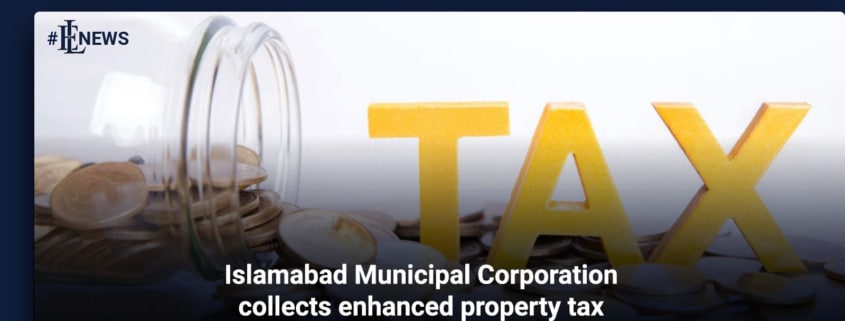Islamabad Municipal Corporation collects enhanced property tax
Islamabad Municipal Corporation collects enhanced property tax. The Municipal Corporation of Islamabad (MCI) is organizing a 200 percent increase in property tax in defiance of a court order and without legal justification.
Justice Mohsin Akhtar Kayani of the Islamabad High Court (IHC) set aside the notice of a 200 percent increase in property tax in the federal capital in December last year and asked the MCI to conduct a public hearing before declaring any increase in property tax.
The CDA and MCI both filed appeals, which remain ongoing before the IHC’s two-member division bench. The MCI, on the other hand, began collecting the additional tax without first obtaining approval from the IHC.
The IHC deemed the 200 percent increase in property tax unconstitutional, noting that “no tax proposals were issued, no objections were requested following Section 88(4) of the ICT Local Government Act, 2015, and no public hearings were held before the application of the property tax in Islamabad.”
IHC rescinded notification of the 200 percent increase in December of last year; appeals against the ruling are still pending. Islamabad Municipal Corporation collects enhanced property tax.
Subsequently, the court ruled that a new notification be issued within six months.
The court order stated: “MCI shall prepare the tax proposal and invite public comment via publication of notice in newspapers, following which a notification following Section 88 of the ICT Local Government Act, 2015 shall be issued following the law within six (06) months positively.”
However, because the local government was disbanded following the elected members’ five-year terms, the law could not be reviewed, according to Qazi Adil Aziz, a former legal counsel and chairman of UC-11, Islamabad.
On the other hand, the MCI distributed property bills to all residents and owners of residential and commercial properties earlier this month in compliance with the “invalid” notification on the letterhead of the CDA’s revenue directorate.
Khawar Ehsan, a resident of F-11, received a property tax bill of Rs98,100 for the fiscal year 2020-21. His most recent invoice for 2019-20 was Rs33,200.
Shahid Iqbal, a resident of G-9, claimed he was required to deposit moreover Rs50,000 for his eight-marla house, although he previously paid only Rs15,000 in property tax.
Advocate Raja Inam Ameen Minhas, who also got a 200 percent increase in property tax, called it unjustified, stating that citizens cannot be forced to pay such a high tax without any value added to the service.
Additionally, the IHC’s judgment stated that “the CDA lacks jurisdiction and authority to assess or collect property taxes in any form, as this is the only prerogative of the MCI under the ICT Local Government Act, 2015. As a result, any tax demand made by the CDA is illegitimate.”
However, the MCI is depositing all tax revenue in CDA accounts.
When contacted, a CDA official stated that the MCI was collecting the tax according to section 132 of the LG Act and remitting it to the CDA for debt servicing.
Read more with EL news : After 32 years, college in Islamabad is still not functional
According to him, the CDA gave Rs20 billion to the MCI since the latter lacked the funds necessary to pay its employees’ wages and provide municipal services. Islamabad Municipal Corporation collects enhanced property tax
As a result, he explained, the CDA is not collecting taxes but is reclaiming the loan from the MCI.
Concerning collecting the 200 percent increase in property tax, the spokesman stated that they generated the invoices to understand that if the CDA’s appeals were denied, they would repay the additional sum to residents and property owners.
According to sources, since the federal cabinet shifted four directorates from the MCI to the CDA in October last year, the latter has had financial difficulties and has had to rely on tax collection.
Qazi Adil Aziz, the MCI’s former legal adviser, informed Dawn that the MCI owed a loan to the federal government. However, he stated that the municipal corporation could repay the debt as soon as it recovered taxes from citizens or generated revenue on its own.
He contended that the CDA could not recover the loan through tax collection, which is being conducted in defiance of a court order and an inappropriate manner.
The IHC reversed the notification of a 200 percent increase in property tax decisions involving nearly 30 identical petitions. The Islamabad Municipal Corporation levies a supplemental property tax.
The petitioners contended that the company abused its authority by approving a 200 percent increase and asked the court to reverse it. Islamabad Municipal Corporation collects enhanced property tax.
The MCI authorized the property tax hike in December 2019, making it effective on July 1, 2020. The revenue directorate was previously part of the CDA but was transferred to the MCI upon establishing a local government in 2016. The Islamabad Municipal Corporation levies a supplemental property tax.
Keep up with Estate Land Marketing for news and updates.




Leave a Reply
Want to join the discussion?Feel free to contribute!